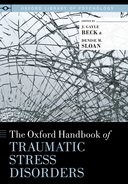 The Oxford Handbook of Traumatic Stress Disorders
The Oxford Handbook of Traumatic Stress Disorders
Contents
-
-
-
-
-
-
-
-
-
-
-
-
-
Assessing PTSD Symptoms Assessing PTSD Symptoms
-
PTSD Assessment Instruments PTSD Assessment Instruments
-
Interviews Interviews
-
Structured Clinical Interview for DSM-IV Axis I Disorders (SCID-I), Clinician Version Structured Clinical Interview for DSM-IV Axis I Disorders (SCID-I), Clinician Version
-
Clinician Administered PTSD Scale (CAPS) Clinician Administered PTSD Scale (CAPS)
-
PTSD Symptom Scale Interview (PSS-I) PTSD Symptom Scale Interview (PSS-I)
-
Structured Interview for PTSD (SI-PTSD) Structured Interview for PTSD (SI-PTSD)
-
Summary Summary
-
-
Self-Report Measures: DSM-correspondent Self-Report Measures: DSM-correspondent
-
Davidson Trauma Scale (DTS) Davidson Trauma Scale (DTS)
-
PTSD Checklist (PCL) PTSD Checklist (PCL)
-
Posttraumatic Stress Diagnostic Scale (PDS) Posttraumatic Stress Diagnostic Scale (PDS)
-
Detailed Assessment of Posttraumatic Stress (DAPS) Detailed Assessment of Posttraumatic Stress (DAPS)
-
-
Self-Report Measures: PTSD-focused, Non-DSM-correspondent Self-Report Measures: PTSD-focused, Non-DSM-correspondent
-
Mississippi Scale for Combat-Related PTSD (Mississippi Scale) Mississippi Scale for Combat-Related PTSD (Mississippi Scale)
-
Impact of Event Scale (IES) Impact of Event Scale (IES)
-
-
Self-Report Measures: Empirically Derived Self-Report Measures: Empirically Derived
-
PK SCALE OF THE MMPI AND MMPI-2 PK SCALE OF THE MMPI AND MMPI-2
-
Symptom Checklist-90-R (SCL-90-R) PTSD Scales Symptom Checklist-90-R (SCL-90-R) PTSD Scales
-
Summary Summary
-
-
-
Psychophysiological Procedures Psychophysiological Procedures
-
Additional Issues in the Assessment of PTSD Additional Issues in the Assessment of PTSD
-
Criterion A Criterion A
-
Malingering Malingering
-
-
Conclusion Conclusion
-
References References
-
-
-
-
-
-
-
-
-
-
-
-
-
-
-
16 Assessing PTSD Symptoms
Get accessMichelle J. Bovin, Department of Psychology, Temple University, Philadelphia, PA
Frank W. Weathers, Department of Psychology, Auburn University, Auburn, AL
-
Published:21 November 2012
Cite
Abstract
Posttraumatic stress disorder (PTSD) is a serious and prevalent mental disorder that poses a number of significant challenges for accurate assessment and diagnosis. In this chapter we describe some of the most widely used PTSD assessment tools for adult trauma survivors, including structured interviews, self-report measures, and psychophysiological methods. We also discuss several key issues in PTSD assessment, including identifying an index traumatic event for symptom inquiry, linking symptoms to the index event, and detecting exaggerated symptom reporting. We conclude with a brief discussion of future directions for research on PTSD assessment.
Sign in
Personal account
- Sign in with email/username & password
- Get email alerts
- Save searches
- Purchase content
- Activate your purchase/trial code
- Add your ORCID iD
Purchase
Our books are available by subscription or purchase to libraries and institutions.
Purchasing information| Month: | Total Views: |
|---|---|
| October 2022 | 2 |
| December 2022 | 5 |
| January 2023 | 4 |
| February 2023 | 8 |
| March 2023 | 4 |
| April 2023 | 1 |
| May 2023 | 1 |
| June 2023 | 2 |
| July 2023 | 2 |
| August 2023 | 1 |
| September 2023 | 2 |
| October 2023 | 2 |
| November 2023 | 3 |
| December 2023 | 1 |
| March 2024 | 1 |
| April 2024 | 1 |
| May 2024 | 1 |
| June 2024 | 1 |
| July 2024 | 1 |
| August 2024 | 1 |
| February 2025 | 24 |
| March 2025 | 2 |
| April 2025 | 2 |

Get help with access
Institutional access
Access to content on Oxford Academic is often provided through institutional subscriptions and purchases. If you are a member of an institution with an active account, you may be able to access content in one of the following ways:
IP based access
Typically, access is provided across an institutional network to a range of IP addresses. This authentication occurs automatically, and it is not possible to sign out of an IP authenticated account.
Sign in through your institution
Choose this option to get remote access when outside your institution. Shibboleth/Open Athens technology is used to provide single sign-on between your institution’s website and Oxford Academic.
If your institution is not listed or you cannot sign in to your institution’s website, please contact your librarian or administrator.
Sign in with a library card
Enter your library card number to sign in. If you cannot sign in, please contact your librarian.
Society Members
Society member access to a journal is achieved in one of the following ways:
Sign in through society site
Many societies offer single sign-on between the society website and Oxford Academic. If you see ‘Sign in through society site’ in the sign in pane within a journal:
If you do not have a society account or have forgotten your username or password, please contact your society.
Sign in using a personal account
Some societies use Oxford Academic personal accounts to provide access to their members. See below.
Personal account
A personal account can be used to get email alerts, save searches, purchase content, and activate subscriptions.
Some societies use Oxford Academic personal accounts to provide access to their members.
Viewing your signed in accounts
Click the account icon in the top right to:
Signed in but can't access content
Oxford Academic is home to a wide variety of products. The institutional subscription may not cover the content that you are trying to access. If you believe you should have access to that content, please contact your librarian.
Institutional account management
For librarians and administrators, your personal account also provides access to institutional account management. Here you will find options to view and activate subscriptions, manage institutional settings and access options, access usage statistics, and more.